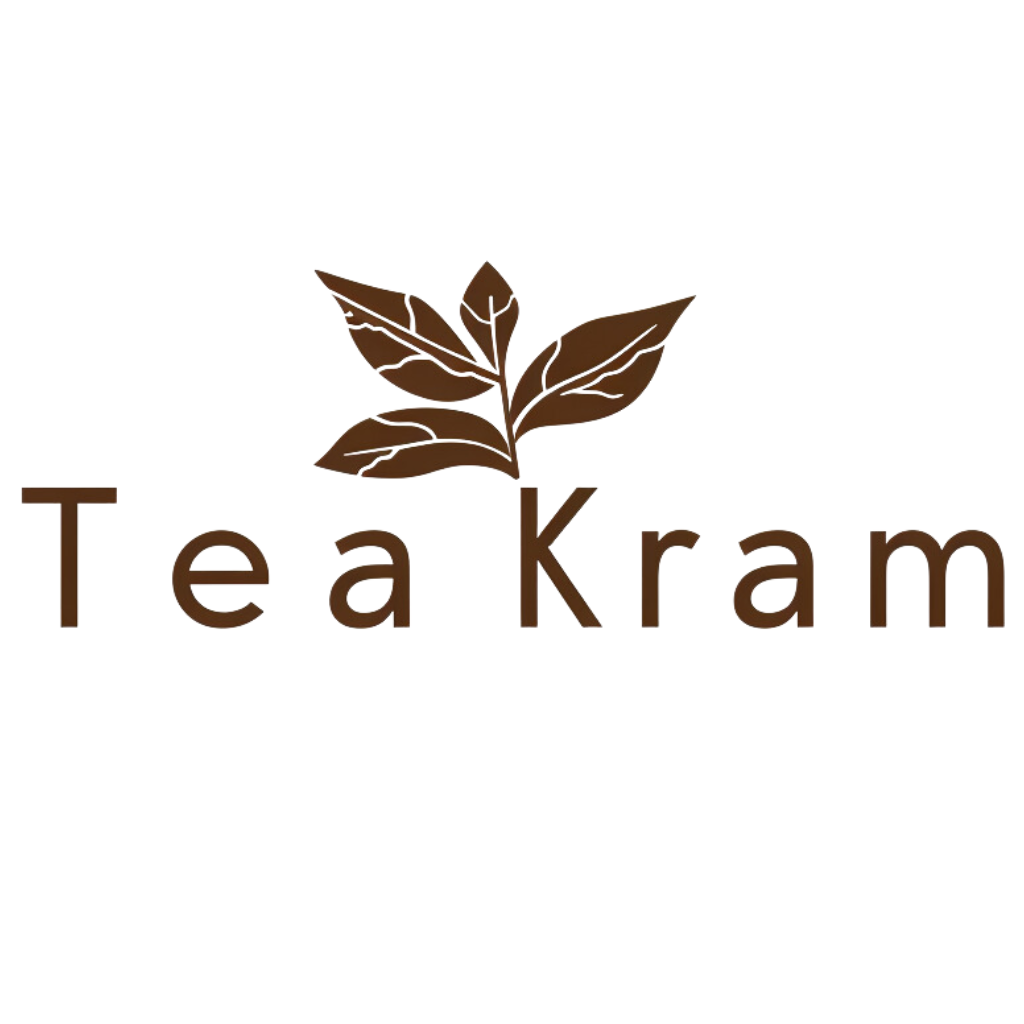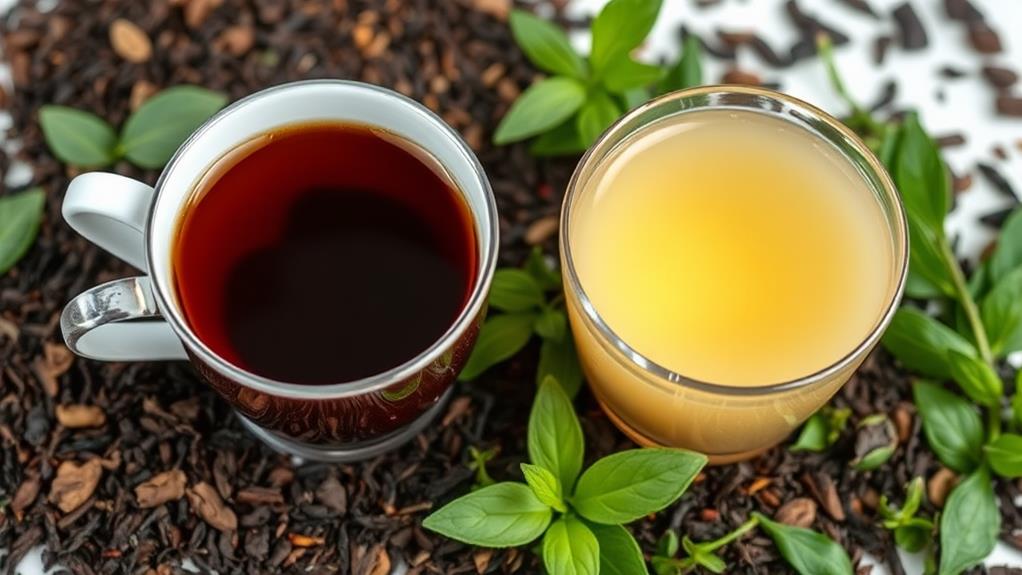Decaf tea and caffeine-free tea differ mainly in their caffeine content and origins. Decaf tea has undergone a process to remove most of its caffeine, but it might still contain small amounts. This tea retains flavors from traditional varieties like black or green tea. On the other hand, caffeine-free tea comes from herbal sources and is naturally devoid of caffeine, featuring unique flavors like chamomile or rooibos. While decaf can be enjoyed any time for a taste similar to regular tea, caffeine-free options are great for late-night sipping without the jitters. Curious about more tea options?
Understanding Caffeine Content
When it comes to tea, understanding caffeine content is essential for making informed choices. You might be wondering how much caffeine is in your favorite brew and how it affects your tea consumption. Different teas vary widely in caffeine levels, with black tea generally containing the most, followed by green, oolong, and white teas.
If you have caffeine sensitivity, the amount can influence your experience significantly. Additionally, certain types of tea, such as green tea, are high in catechins, which can further impact your health and energy levels.
Caffeine's stimulating effects can vary from person to person. For some, even a small amount can lead to jitters or disrupted sleep. If you're a tea lover who enjoys sipping throughout the day, knowing the caffeine content helps you balance your enjoyment without overdoing it.
For those seeking innovation, consider exploring herbal teas, which are naturally caffeine-free and offer a range of flavors and benefits.
In essence, being mindful of caffeine can enhance your tea experience. It allows you to choose the right tea for the right moment—whether you need a boost in the morning or a calming blend at night.
The Decaffeination Process
Decaffeination typically occurs after the tea leaves are harvested and before they're processed into the final product. This process is essential for making decaf tea, and understanding it can help clear up some common decaf misconceptions.
You might think all decaf tea tastes bland or lacks aroma, but that's not necessarily true!
During decaffeination, tea leaves go through various methods, each with its unique brewing impact. Here are some popular techniques:
- Water Process: Uses water to dissolve caffeine, leaving behind flavorful compounds.
- CO2 Method: Employs carbon dioxide under high pressure to extract caffeine while preserving taste.
- Chemical Solvents: Involves using solvents to remove caffeine; it's effective but can raise eyebrows.
- Natural Decaffeination: Some methods use enzymes to break down caffeine naturally.
These methods ensure that you enjoy a cup of tea without the jitters.
While decaf tea mightn't be completely free of caffeine, it usually contains just a fraction compared to its caffeinated counterpart.
Types of Decaf Tea
When you think about decaf tea, you might wonder how it's made and what varieties are out there.
Different decaffeination methods can affect the flavor and quality of the tea, so it's good to know your options.
Let's explore some popular decaf tea types and the processes behind them!
Decaffeination Methods Explained
If you're curious about how decaf tea is made, you'll find that several methods are used to remove caffeine while preserving flavor.
Let's clear up some decaf misconceptions and caffeine myths along the way!
Here are four popular decaffeination methods:
- Chemical Solvents: This method uses solvents like ethyl acetate to extract caffeine. It's efficient but can raise eyebrows due to the chemicals involved.
- Carbon Dioxide Process: In this innovative technique, carbon dioxide is pressurized to selectively remove caffeine without sacrificing flavor. It's a favorite among eco-conscious consumers!
- Water Process: This method uses hot water to extract caffeine and then filters it through charcoal. It's caffeine-free and retains much of the tea's original taste.
- Swiss Water Process: Similar to the water process, this method uses only water and is 100% chemical-free, making it a top choice for health enthusiasts.
Each method has its pros and cons, but they all aim to deliver a delightful cup of decaf tea.
Popular Decaf Tea Varieties
After understanding how caffeine is removed from tea, you might be wondering which types of decaf varieties are available.
There's a delightful world of decaf tea waiting for you, and it's bursting with flavor! Many of these decaf options still offer unique health properties that can contribute to your overall well-being.
One popular choice is decaf black tea. It offers the bold taste you love, minus the jitters. For something lighter, consider decaf green tea. It's refreshing and packed with antioxidants, all while keeping that vibrant decaf flavor.
Don't overlook herbal tea varieties, either! Many herbal teas are naturally caffeine-free, but you can also find decaf options. Chamomile is a classic, known for its calming effects, while rooibos brings a sweet, nutty twist.
If you're adventurous, try decaf chai; it mixes spices with a comforting warmth, perfect for cozy evenings.
For those who crave a taste of the exotic, you might enjoy decaf oolong or even decaf white tea. Each type offers a unique experience, allowing you to explore different flavors without the buzz.
What Is Caffeine-Free Tea?
Caffeine-free tea is a beverage made from herbal ingredients or naturally caffeine-free plants, making it a great choice for those who want to enjoy tea without the stimulating effects of caffeine.
Unlike traditional teas that derive caffeine from tea leaves, caffeine-free options offer a variety of flavors and health benefits. Additionally, many caffeine-free herbal teas, such as chamomile or rooibos, are also known for their environmental impact and benefits, as they can be sourced sustainably and are often compostable.
They're perfect for relaxing evenings or when you want to avoid caffeine sources altogether.
Here are some popular herbal alternatives you might want to try:
- Chamomile: Known for its soothing properties, it's great before bedtime.
- Peppermint: A refreshing choice that can aid digestion and invigorate your senses.
- Rooibos: This South African tea is rich in antioxidants and has a naturally sweet flavor.
- Hibiscus: With its tangy taste, it's not only delicious but also packed with vitamins.
These caffeine-free teas provide an innovative twist to your beverage choices.
Whether you're looking for a warm cup to wind down or a refreshing iced tea, you'll find plenty of options that embrace the essence of tea without the caffeine buzz.
Enjoy exploring these vibrant flavors!
Health Benefits of Each
Exploring the health benefits of caffeine-free teas reveals a wealth of advantages that can enhance your well-being. These teas often boast impressive antioxidant properties, which help combat free radicals and support overall health. When considering your choices, you'll find both decaf and caffeine-free options have unique benefits.
Here's a quick comparison:
| Feature | Caffeine-Free Tea | Decaf Tea |
|---|---|---|
| Antioxidant Properties | High | Moderate |
| Health Considerations | Good for sensitive users | May still contain some caffeine |
| Best For | Nighttime enjoyment | Daytime relaxation |
Caffeine-free teas are perfect for late-night sips, helping you unwind without the jitters. They're often rich in vitamins and minerals, which can promote a healthier lifestyle. On the other hand, decaf tea can still provide some caffeine benefits while reducing your intake.
Flavor Profiles Compared
When you taste decaf and caffeine-free tea, you might notice some surprising differences.
The way each type is brewed can really change their flavor, bringing out unique notes that could tickle your taste buds.
Let's explore how these taste variations come to life and what brewing methods can do for your cup!
Taste Variations Explored
In the world of tea, taste variations between decaf and caffeine-free options can be subtle yet significant. You might think that removing caffeine wouldn't change much, but the differences in flavor intensity and aroma can surprise you.
For instance, the brewing techniques and quality of the ingredients can greatly influence the final taste, which is also true for traditional green tea varieties like Matcha. Decaf tea typically retains some of its original components, so you may notice:
- A richer, fuller flavor profile
- Aroma differences that evoke warm, comforting notes
- A slight bitterness that can enhance certain blends
- A smoother finish that lingers pleasantly on your palate
On the other hand, caffeine-free tea, often made from herbal ingredients, offers a different experience. The flavor can be lighter and more delicate, showcasing the unique qualities of the herbs used.
If you're looking for something fresh and innovative, caffeine-free options might just tickle your taste buds in ways you hadn't expected.
Brewing Methods Impact
The art of brewing tea significantly impacts its flavor profile and overall enjoyment. When you're brewing tea, you'll want to consider factors like brewing temperature and steeping time.
For example, delicate herbal blends often require cooler water and shorter steeping times to avoid bitterness, while robust black teas thrive on higher temperatures for longer infusion. Additionally, high water quality is essential for optimal tea brewing, as using filtered water can enhance flavor extraction, while tap water with strong minerals might dull your tea's brightness.
Understanding water quality's impact on taste can elevate your brewing experience. The size of your tea leaves matters too; whole leaves typically offer a more complex flavor than dust or broken leaves, so keep that in mind.
Experimenting with different infusion techniques can also change your brew strength. Try the "flash infusion" method for a quick but flavorful cup, or a longer steep for a bolder experience.
Pay attention to how these variables affect your tea's taste, and don't be afraid to get creative! By adjusting these elements, you can find the perfect balance that suits your palate and brings out the best in both decaf and caffeine-free options.
Happy brewing!
Choosing the Right Option
While you might think all teas are created equal, choosing between decaf and caffeine-free options requires some consideration of your needs and preferences.
Start by reflecting on your taste preferences and health considerations. If you're sensitive to caffeine, opting for caffeine-free tea might be your best bet. However, if you enjoy the flavor of traditional tea but want to limit caffeine, decaf could offer that perfect balance.
Here's what to keep in mind:
- Caffeine Sensitivity: Understand how caffeine affects you personally.
- Flavor Experiences: Explore the diverse flavors that both options provide.
- Lifestyle Choices: Consider when you plan to drink tea—day or night?
- Beverage Alternatives: Think about other drinks that might fit your routine.
FAQ
Can Decaf Tea Still Contain Trace Amounts of Caffeine?
Yes, decaf tea can still contain trace amounts of caffeine due to decaf processing methods. While caffeine levels are significantly reduced, complete removal isn't always possible, so you might still notice some caffeine presence.
Is Decaf Tea Safe for Pregnant Women?
Imagine sipping a soothing cup during pregnancy. Decaf tea's benefits, like hydration and antioxidants, can be safe for you, but it's wise to consult your doctor to ensure it fits your unique health journey.
How Does Decaf Tea Affect Sleep Quality?
Decaf tea can enhance your sleep quality by promoting relaxation without the jitters that caffeine brings. Embracing its decaf benefits can help stabilize your sleep patterns, allowing you to wake refreshed and ready for innovation.
Are There Any Artificial Additives in Decaf Tea?
Ever wonder what's in your decaf tea? While decaf processing usually aims for purity, some brands might add artificial additives to enhance the flavor profile. Always check labels to ensure you're sipping innovation, not chemicals!
Can I Find Decaf Options in Herbal Teas?
Yes, you can find decaf options in various herbal tea varieties. Many brands use caffeine extraction methods to create delicious blends without the jitters, allowing you to enjoy innovative flavors while keeping caffeine at bay.
Final Thoughts
In conclusion, whether you choose decaf or caffeine-free tea, both options have their unique qualities. Decaf retains some caffeine, while caffeine-free tea has none at all. So, if you're looking to enjoy a relaxing cup without the jitters, which one will you pick? Each type can offer delightful flavors and potential health benefits, making your choice as much about taste as it is about caffeine content. Explore both and find the perfect brew for your needs!



